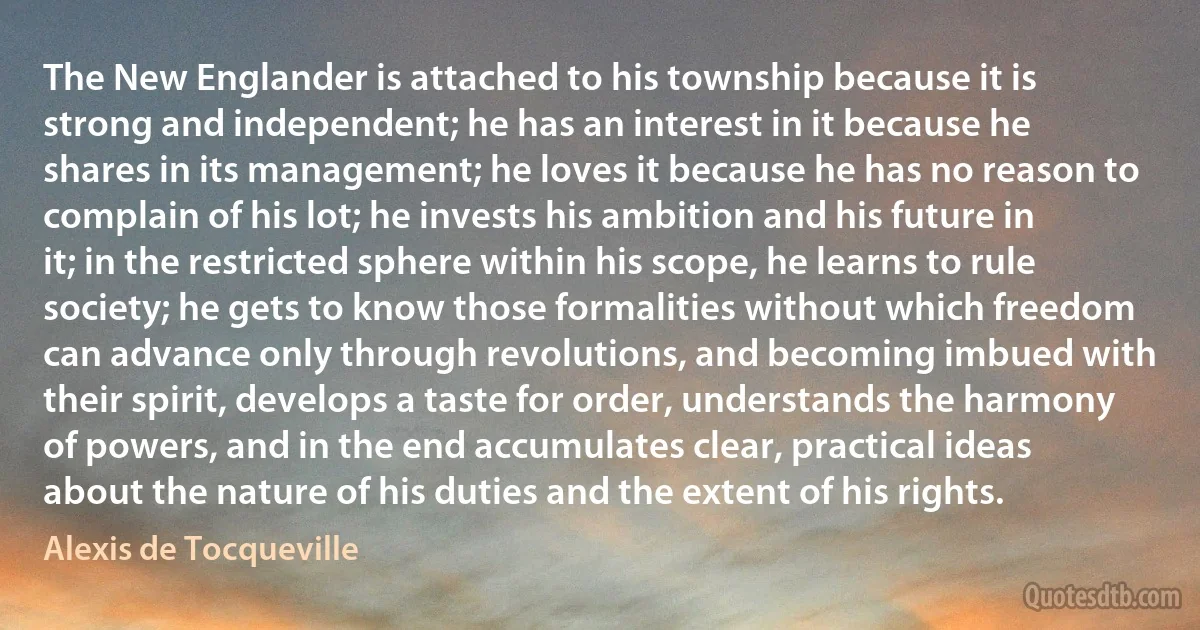
The New Englander is attached to his township because it is strong and independent; he has an interest in it because he shares in its management; he loves it because he has no reason to complain of his lot; he invests his ambition and his future in it; in the restricted sphere within his scope, he learns to rule society; he gets to know those formalities without which freedom can advance only through revolutions, and becoming imbued with their spirit, develops a taste for order, understands the harmony of powers, and in the end accumulates clear, practical ideas about the nature of his duties and the extent of his rights.
Alexis de TocquevilleRelated topics
advance ambition becoming clear end freedom future harmony interest nature order reason rule spirit tasteRelated quotes
Everywhere, no matter what the sphere of interest (whether religious, political, or personal), the really creative acts are represented as those deriving from some sort of dying to the world; and what happens in the interval of the hero's nonentity, so that he comes back as one reborn, made great and filled with creative power, mankind is also unanimous in declaring. We shall have only to follow, therefore, a multitude of heroic figures through the classic stages of the universal adventure in order to see again what has always been revealed. ...the singleness of the human spirit in its aspirations, powers, vicissitudes, and wisdom.

Joseph Campbell
"Heaven helps those who help themselves" is a well-tried maxim, embodying in a small compass the results of vast human experience. The spirit of self-help is the root of all genuine growth in the individual; and, exhibited in the lives of many, it constitutes the true source of national vigour and strength. Help from without is often enfeebling in its effects, but help from within invariably invigorates. Whatever is done for men or classes, to a certain extent takes away the stimulus and necessity of doing for themselves; and where men are subjected to over-guidance and over-government, the inevitable tendency is to render them comparatively helpless.

Samuel Smiles
You're obliged to pretend respect for people and institutions you think absurd. You live attached in a cowardly fashion to moral and social conventions you despise, condemn and know lack all foundation. It is that permanent contradiction between your ideas and desires and all the dead formalities and vain pretenses of your civilization which makes you sad, troubled and unbalanced. In that intolerable conflict you lose all joy of life and all feeling of personality, because at every moment they suppress and restrain and check the free play of your powers. That's the poisoned and mortal wound of the civilized world.

Octave Mirbeau
Idea or Vision, in its sensuous meaning, would be something that could be perceived only by the bodily eye and not by any other sense such as taste, hearing, etc.; it would be such a thing as a rainbow, or the forms which pass before us in dreams. Idea or Vision, in its supersensuous meaning, would denote, first of all, in conformity with the sphere in which the word is to be valid, something that cannot be perceived by the body at all, but only by the mind; and then, something that cannot, as many other things can, be perceived by the dim feeling of the mind, but only by the eye of the mind, by clear perception.

Johann Gottlieb Fichte
I am not [...] asserting that humans are either genial or aggressive by inborn biological necessity. Obviously, both kindness and violence lie within the bounds of our nature because we perpetrate both, in spades. I only advance a structural claim that social stability rules nearly all the time and must be based on an overwhelmingly predominant (but tragically ignored) frequency of genial acts, and that geniality is therefore our usual and preferred response nearly all the time. [...] [T]he center of human nature is rooted in ten thousand ordinary acts of kindness that define our days.

Stephen Jay Gould
